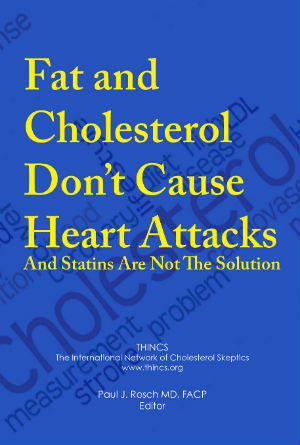Fat and Cholesterol Don't Cause Heart Attacks 2 of 3

By Paul J. Rosch, M.D., M.A., F.A.C.P.
The following is excerpted from the book:
Fat and Cholesterol Don't Cause Heart Attacks And Statins Are Not The Solution
The Framingham Study has had more of an impact on coronary heart disease research than any other epidemiological project. It was initiated by the National Institutes of Health (NIH) in 1950 to validate the lipid hypothesis by following 28,000 residents of Framingham, a small manufacturing town near Boston.
It allegedly provided the first "solid evidence" that those with high cholesterols were at greater risk for heart attacks and that smoking and hypertension were also "risk factors" that had an additive effect.
George Mann was involved early on to develop a nutritional survey to evaluate the effect of diet on cholesterol. An extensive analysis of the results completed by 1960 was never published, possibly because it found that participants had widely varying cholesterol levels and that "something explains this inter individual variation, but it is not diet."
William Kannel, Director of the Framingham Study from 1966 to 1979, never referred to this, but told the press that the Framingham results essentially proved that cholesterol was a powerful predictor of heart disease, and coined the term "risk factor".
However, a subsequent study showed a direct association between falling cholesterol levels over the first 14 years and increased mortality rates over the following 18 years. A 1987 30-year follow-up report found that those whose cholesterol had decreased spontaneously over 30 years were at greater risk of dying from heart disease than those whose cholesterol had increased, and "For each 1% mg. drop in cholesterol there was an 11% increase in coronary and total mortality."
Although the study showed that a drop in cholesterol was associated with increased coronary deaths, it was cited as supporting the cholesterol-coronary link!
What the public read in the joint AHA-NIH 1990 publication, The Cholesterol Facts, was, "The results of the Framingham study indicate that a 1% reduction in cholesterol corresponds to a 2% reduction in CHD risk."
It also stated, "The most important overall finding is the emergence of the total cholesterol as a risk factor of CHD in the elderly". No data was presented to support this erroneous claim, since men over 47 with low cholesterol actually had higher mortality rates than those with elevated levels.
The real truth about diet and cholesterol finally emerged in a 1992 editorial by William Castelli, who had replaced Kannel as Framingham Director in 1979, as follows:
Most of what we know about the effects of diet factors, particularly the saturation of fat and cholesterol on serum lipid parameters, derives from metabolic ward-type studies. Alas, such findings, within a cohort studied over time have been disappointing, indeed the findings have been contradictory. For example, in Framingham, Mass, the more saturated fat one ate, the more cholesterol one ate, the more calories one ate, the lower the person’s serum cholesterol.
Castelli stated in a subsequent article that nearly 75 percent of heart attacks were in people with normal cholesterol levels.
Paul J. Rosch, M.D., M.A., F.A.C.P.







